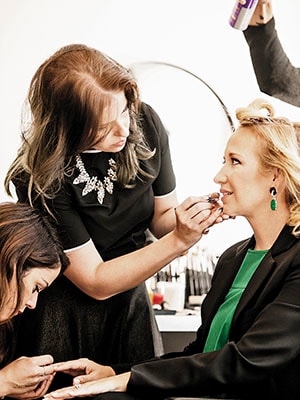
Glamsquad: Beauty on demand
Glamsquad is the latest startup to apply the Uber model to a traditional industry. With a dozen beauty copycats jumping in, a shakeout is coming
A makeup artist hovers over Beth Lusko, applying bronze eye shadow to complement her Hamptons tan. A hairdresser simultaneously blow-dries her long, damp hair into loose curls. The two stylists keep out of each other’s way with practiced ease. The scene wouldn’t be out of place backstage at a fashion show, but it’s happening in Lusko’s Manhattan kitchen at 8 am on a Tuesday. Her two small children take turns wriggling in and out of her lap.
The 39-year-old publishing executive set up these appointments using Glamsquad, an on-demand beauty service that launched in 2014. Lusko uses the startup’s mobile app to order stylists to her condo, usually before presentations or work dinners. In New York City, Glamsquad is fast becoming a household name among women with demanding schedules and plenty of disposable income. “It’s tough to get that 6:30 am to 7:30 am slot,” she says. The half-hour visit costs $155, including tip.
Glamsquad’s CEO is Alexandra Wilkis Wilson, co-founder of daily deals site Gilt Groupe. She left the billion-dollar ecommerce company after seven years to lead Glamsquad, wooed by her Harvard undergrad classmate Jason Perri, who is the site’s co-founder and chairman. Wilson saw the moneymaking potential of applying an Uber model to another massive, disparate market: US spas and salons, which will do $40 billion in sales this year on the back of a workforce that is 65 percent freelance.
Wilson came on board first as an advisor, then took the top job last September before investing personally in the startup. “I got hooked on many levels,” she says from Glamsquad’s Manhattan office, its pink-accented lobby doubling as a training salon.
The company won’t disclose financials, but Forbes estimates gross sales of about $8 million in its first year. Wilson aims to launch in 15 cities within the next two years, up from its current footprint in style hotspots New York, Los Angeles and Miami. The startup has raised $9 million in two venture rounds to date. But it’s a crowded market with nearly no barriers to entry: A scroll through the iPhone App Store reveals a host of companies offering similar services, with names like Stylisted, Beautified and BeautyBooked.
Of Glamsquad’s competition, the most venerable is Vênsette, founded in 2010 by one-time hedge fund analyst Lauren Remington Platt and offering at-home beauty appointments starting at $100—twice the price of Glamsquad’s blow-dry. “There has been a rise in a lot of cheaper on-demand services, but you’re really gambling with the quality,” says Platt. One of Vênsette’s early advisors was none other than Alexandra Wilkis Wilson; the relationship ended before Wilson became Glamsquad’s CEO. Platt, who has secured $3 million in funding, isn’t dwelling on it. “We’re very much focussed on sales,” she says. “Making money.”
Neither company would exist if it weren’t for the runaway success of Drybar, the chain of nearly 50 blowout salons founded by California hairstylist Alli Webb in 2008. By offering no haircuts or colour services, the company keeps expenses low and margins high. This year, it will clear $70 million in revenues. Drybar has helped cement the idea of having one’s hair styled as an affordable habit rather than an indulgence reserved for a wedding. In July, Webb launched Dry on the Fly, an in-home blowout app directly competing with Glamsquad and charging $75 for one of Drybar’s signature ’dos.
Mobile beauty isn’t a new concept: Hairdressers, manicurists and masseuses have long made house calls. What Glamsquad offers women is instant gratification. A stylist can be at a client’s home or office within the hour. The company’s clientele is already accustomed to using serve-me-this-second apps like Instacart for one-hour grocery delivery, Flycleaners for laundry pickup and Shyp as an on-demand post office. Glamsquad’s $7.5 million Series A funding round in October was led by a woman, SoftBank’s Marissa Campise. Wilson thinks that fact is significant: “She didn’t have to go ask her wife or her sister or her daughter. She just understood it.”
When Campise did her research, she saw a fragmented market and a clientele of rich women buying a blowout a week. “Some men don’t understand how much women spend on beauty services,” she says. “I see that as my investment advantage.”
Online beauty startups lacking Wilson’s connections and track record haven’t had as easy a time raising funds. When San Francisco entrepreneur Melody McCloskey founded appointment-booking platform StyleSeat four years ago, she had to bootstrap. “Being a hair startup in Silicon Valley in 2011 was a joke,” she says, adding that many male investors didn’t understand the proposition. “They go to Supercuts.”
McCloskey has since raised almost $40 million in venture backing after showing investors her company’s organic growth, with 1.5 million appointments booked per month through StyleSeat. “The pitch had to be not about hairstylists at all,” she says.
The success to date of StyleSeat, Glamsquad and Vênsette may well pave the way for more women-led businesses to secure funding. Wilson agrees, citing recent research from venture firm First Round Capital. Of the nearly 600 founders across their portfolio, those who were part of a team with a woman at the helm performed 63 percent better than all-male counterparts.
It remains to be seen whether there’s room in the market for Glamsquad’s growing list of competitors. The daily race for women like Beth Lusko to secure a 6:30 am at-home blowout suggests the demand is there. “I have to get a lot done prior to 9 am,” Lusko says. “I don’t want to forsake seeing my kids to do it.”
(This story appears in the 30 November, -0001 issue of Forbes India. To visit our Archives, click here.)





